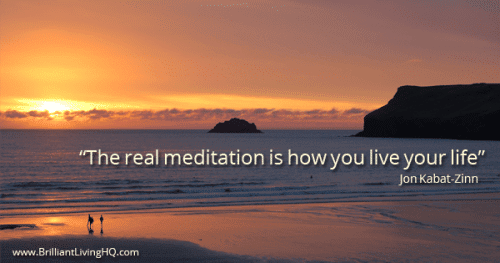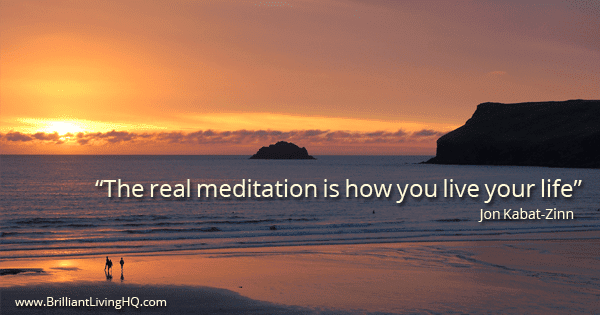Mindfulness, the capacity to be with and in the constant flow of awareness, is an inherent ability that we all share. Mindfulness practice is about being aware more often, being awake more often, and receiving the current moment, with all its experiences, in an open and welcoming manner. Mindfulness is something you can only experience but it is something we can practice and this practice can be facilitated through training.
Mindfulness will enable you over time to feel a greater sense of connectedness and also kindness with yourself and others, become more aware of your thoughts, feelings and also of how you can sometimes imprison yourself with these. Ultimately mindfulness will help you wake up to your senses, make more conscious choices and break persisting patterns of behavior.
How? By enabling you to consciously focus your attention on the present moment without judging.
In our busy lives, we seldom take the time to focus on taking care of ourselves, and nurturing both body and mind. Our modern culture is all about achievement and we often don’t allow ourselves just to be, to take time to connect with what is going on, what is present inside of us.
Acknowledge that by following this training, you are giving space to yourself to be which is a great gift and one that will allow you to develop a fundamentally different outlook on life.
ABOUT MBSR (mindfulness-based stress reduction) program
The mindfulness-based stress reduction program is a well-established methodology, created by Jon-Kabat-Zinn in 1979 (PhD University of Massachusetts), containing a certain set of fundamental practices and teachings. The course includes guided practices, full-group inquiry, mind-body awareness practices, stress anatomy and physiology, compassion and loving-kindness.
MBSR is not therapy. It is about practicing present moment awareness and being with what is. What it means to you and how it relates to your past are issues to explore with a licensed therapist. MBSR doesn’t remove stress, anxiety or pain, it allows us to relate to it differently, and this in turn tends to reduce the stress, anxiety or pain we actually experience.
THE IMPORTANCE OF PRACTICING BETWEEN CLASSES
“You don’t have to like it, you just have to do it” — JON KABAT-ZINN
The way Jon Jabat-Zinn puts it above, might not sound very appealing but it is sound advice: the only way to learn mindfulness is through practice. I invite you to really commit to making space in your daily life to living mindfully _ at least for the 8 weeks of the training and see where it takes you.
The success of this approach depends for a large part on your willingness to do home practice between class meetings. This involves tasks such as light reading, listening to recorded audio meditations that will be provided, performing brief exercises and noting of experiences. Recommended home practice: at least 30 minutes 6 times a week for 8 weeks.
It is often very difficult to carve out that amount of time for something new in lives that are already very busy and crowded. However, the commitment to spend time on home practice is an essential part of the class.
To help you find the room in your life for this new commitment, it is helpful to consider the following:
- Where and when in your day will you find the time needed for practice? Try and do the exercises in the same place each time, a place where you will not be disturbed. Try and minimize distractions (shut down electronic devices). Find the right time which works for you.
- Let others in your family or social circle know what is involved.
- See if you can balance the different motivations that naturally come up, such as being impatient for results versus letting go of your expectations for 8 weeks.
- Treat yourself with kindness throughout this time, especially if you run into some rough spots.
PATIENCE AND PERSISTENCE
Because we will be working to change well-established habits of mind, you will be putting in a lot of time and effort. The effects of this effort may become apparent only later. In many ways, it is much like gardening—we have to prepare the ground, plant the seeds, ensure that they are adequately watered and nourished, and then wait patiently for results.
Try to approach the classes and home practice with a spirit of patience and persistence, committing yourself to put time and effort into what will be asked of you, while accepting, with patience, that the fruits of your efforts may not show straight away. Do not strive to achieve anything, just be patient.
FACING DIFFICULTIES AND LEARNING TO ACCEPT WHAT IS
The classes and the home practice assignments can teach you how to be more fully aware and present in each moment of life. On one hand, this makes life more interesting, vivid, and fulfilling. On the other hand, you will also become more aware of difficulties or things stressing you out. This can bring about strong emotions that you may not have fully processed in the past. It is important to try and be with these, even if it is unpleasant and difficult. In practice, you will find that turning to face and acknowledge difficulties is the most effective way, in the long run, to reduce unhappiness. Seeing unpleasant feelings, thoughts, or experiences clearly, as they arise, means that you will be in much better shape to deal with them, before they progress to more intense or persistent unhappiness. Resistance and fighting against stress or unpleasant experiences creates more tension and stress. However, if at any point, you feel this is too much to handle and you feel overwhelmed please do not hesitate to let me know immediately so we can discuss how to approach this. I am always available to support you in-between sessions if needed.
YOU ARE OKAY, JUST THE WAY YOU ARE
The mindfulness approach is that you are fine just the way you are in this moment. Try and let go of expectations from yourself on how you should be, what you should think, how you should feel, how you should behave and react, what you should achieve. Allowing yourself to just be and accept what is, is both comforting and empowering.
Time: 19:00-21:00
Dates: Tuesday March 1, March 8, March 15, March 22, March 29, April 5, April 12, April 19.
Retreat day on April 23 from 11:00-13:00 and 14:00-16:00
Price:€375
Teacher: Ozlem Peker
Langage: English
For the intake interview (takes 15-30 minutes), please contact Ozlem Peker on 06-57611620 or ozlempeker11@gmail.com
Mindfulness Training (MBSR) (English)



